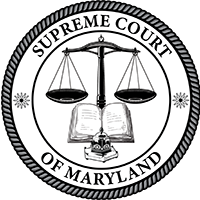SCHEDULE OF ORAL ARGUMENTS
September Term, 2023
Monday, February 5, 2024:
Bar Admissions
No. 15 State of Maryland v. Steven Anthony Thomas
Issues – Criminal Procedure – 1) Does Maryland Rule 4-345(e), which states that a court “may not revise the sentence after the expiration of five years from the date the sentence originally was imposed,” mean that a court may not revise a sentence under Rule 4-345(e) after the five-year period expires? 2) Where a defendant timely files a motion to modify under Maryland Rule 4-345(e) and repeatedly requests a hearing on the motion, is the trial court required to exercise its discretion within five years, i.e. either deny the motion without a hearing or hold a hearing to determine whether to grant the motion, or does the rule permit the court to let the five years lapse without exercising discretion?
Attorney for Petitioner/Cross-Respondent: Jer Welter
Attorney for Respondent/Cross-Petitioner: Stephanie Asplundh
No. 26 Derek Harvey, et al. v. Jared DeMarinis, in his official capacity as the State Administrator of Elections, et al.
Attorney for Appellant: Adam D. Greivell
Attorney for Appellee: Daniel Kobrin
Tuesday, February 6, 2024:
No. 19 Valerie Rovin v. State of Maryland
Issues – Constitutional Law – 1) Did ACM err in concluding that the “objectively reasonable” mistake of law test articulated by the U.S. Supreme Court in Heien v. North Carolina, 574 U.S. 54 (2014), applies to civil constitutional tort claims arising under the Maryland Constitution, including Article 26 of the Maryland Declaration of Rights? 2) Did ACM err in concluding that the “objectively reasonable” mistake of law test articulated in Heien applies to claims arising under Maryland’s common law, such as for false arrest, false imprisonment, and malicious prosecution? 3) Did ACM err in determining that the officers in Petitioner’s case made an objectively reasonable mistake-of-law in arresting, imprisoning, and prosecuting her and that, as a result, Petitioner’s claims failed as a matter of law? 4) Did ACM err in determining that the juror intimidation statute in Md. Code Criminal Law Article § 9-305(a) was not unconstitutionally vague, in violation of the due process protections guaranteed by Article 24 of the Maryland Declaration of Rights? 5) Did ACM err in determining that Petitioner’s free speech rights under Article 40 of the Maryland Declaration of Rights were not violated? 6) Was the warrant issued for Petitioner’s arrest invalid based on the contents of the warrant affidavit, which show no crime was committed?
Attorney for Petitioner: Peter C. Hershey
Attorney for Respondent: Kirstin Lustila
No. 21 Troy Mason v. State of Maryland
Issues – Criminal Law – 1) Did ACM err in ruling that a mistrial was not required simply by virtue of the inadvertent nature of the discovery error? 2) Is “error correction” a legitimate reason to allow previously undisclosed evidence into trial, thereby excusing a discovery violation, where the new evidence contradicts information disclosed during discovery and previously relied on by the defense at trial? 3) Did the courts below abuse their discretion by finding no prejudice warranting a mistrial or curative instruction, where during discovery the State produced a blank Strangulation Supplement documenting no injuries to the complaining witness that was relied on by defense counsel at trial, and where surprise testimony revealed that the disclosed Supplement was erroneous and that the original Strangulation Supplement – which was not produced during discovery – did document injuries?
Attorney for Petitioner: Anne K. Olesen
Attorney for Respondent: Ever Hess
After February 6, 2024, the Court will recess until February 29, 2024. On the day of argument, counsel must register in the Clerk’s Office no later than 9:30 a.m. unless otherwise notified.
GREGORY HILTON
CLERK

